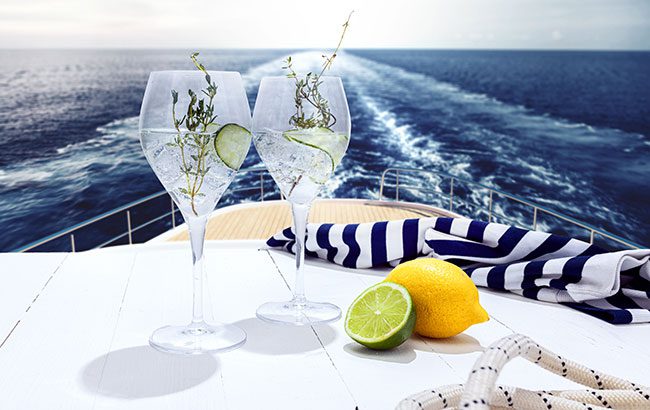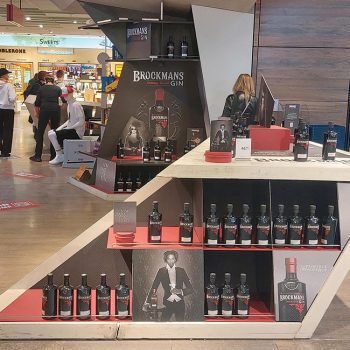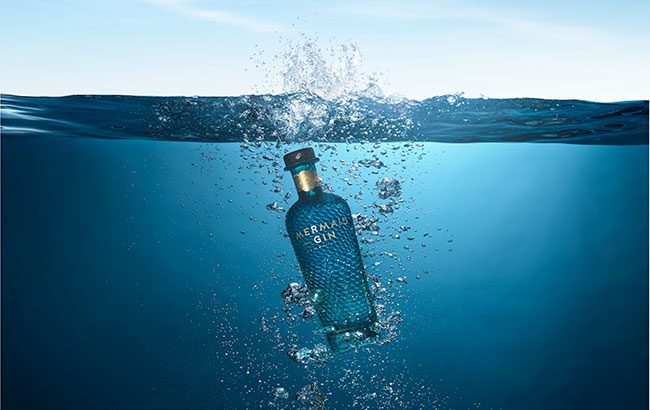Gin brands head to sea to conquer GTR
By Nicola CarruthersWith airports cutting back on the amount of shelf space they give over to gin, producers are targeting cruise and ferry passengers to boost their sales in global travel retail (GTR), with one brand even having a distillery on board a ship.

*This feature was originally published in the February 2025 issue of The Spirits Business magazine.
Despite reports the gin bubble has burst in key markets like the UK and Spain, the category is experiencing some success in global travel retail (GTR).
The latest data from IWSR Drinks Market Analysis suggests gin’s volume in GTR will increase at a compound annual growth rate of 2% from 2023 to 2028, following a 1% rise in the previous five years (2018-2023). The category had an 8% volume share of GTR spirits in 2024, according to IWSR, but this is expected to dip by one percentage point by 2028. The category is the third largest in GTR for spirits, after Scotch and Cognac.
Barry Geoghegan, founder of Duty Free Global, which looks after brands such as Gunpowder Irish Gin and Mermaid Gin, notes how 2024 was the “most difficult year” for the category, with duty free retailers reducing the amount of gin on their shelves. In some cases, Geoghegan notes that buyers were consolidating their ranges from 40 gins to 20. “Certainly between 35% and 40% of the assortment was being delisted,” he explains, with “no interest in anything under £20”. It has been a particular challenge in the UK, a major market for gin, he says.
Multinationals have been discounting their products in UK airports (Diageo was offering two bottles for £20 across its gin, vodka and rums, for example). Geoghegan believes it was the more premium prices of smaller gin brands, combined with product innovation, that meant they “survived the cull” by retailers.

Henri Brunel, commercial director of English gin Brockmans, says while travel retail is a strategic channel for the brand, limited shelf space remains a challenge. But the brand has been doing well in GTR, growing by double digits in the past year, he notes.
Like Geoghegan, he says super-premium gin in Europe has suffered from consolidation, with markets like the UK, France, Spain, Italy, and Germany either “declining or are flat”.
The priority for Brockmans is to establish the brand in Europe, in growth markets such as Greece, Croatia, Serbia, Malta and Turkey. Brunel notes that Eastern Europe is an important area of business.
Geoghegan believes innovation through new variants has been a way for brands to survive and avoid being delisted: “Innovation was the key to those that didn’t get culled. If you want to survive, you need to innovate. Innovation has been one way that brands have been protected.”
He notes that the launch of Gunpowder’s pineapple-flavoured gin has been popular in the Nordics, particularly in Finland. Packaging has also helped to boost sales of Mermaid Gin, which comes in a vibrant Instagram-friendly sustainable textured bottle made from recyclable glass.
Higher-ABV offerings
Brockmans has created a higher-ABV (47.3%) organic version of its gin for travel retail, which Brunel notes offers the “most discount for the consumer”.
Weighing only 500g, the bottle is the lightest of the top-selling premium gin brands, and has a post-consumer recycled-glass content of 51%.
Similarly, last year Ryan Reynolds-backed Aviation American Gin launched Expedition Strength, exclusively for travel retail, with an ABV of 46.5%.
Angus Lugsdin, co-founder and director of Salcombe Gin, has also seen “more shelf space being given over to different categories” such as Tequila. Despite the heavy discounting being seen in UK airports, Lugsdin says it makes “super-premium craft brands very accessible”, adding that the savings you can make in duty free are “very significant” compared with buying on the high street or via e-commerce. “It encourages people to trial,” he adds, with consumers seeking out fresh brands.
Another travel retail outlet is the cruise sector, which Geoghegan describes as the “ultimate brand-building opportunity”.

It has become hugely important for Salcombe, particularly with its location on the south Devon coast. In 2021, P&O Cruises teamed up with the brand to put a gin distillery on its new cruise ship, Iona. The brand created a gin, Marabelle, which is distilled on board in 50-litre stills, with a Mediterranean edition also recently launched. The expressions can only be bought on P&O’s Iona and Arvia ships. Due to the limited space on cruise ships, it’s more beneficial for Salcombe as there is less competition. “You imagine the size of a duty free store in an airport versus on a cruise ship. They can carry less range, and the audience is a captive one,” says Lugsdin.
The company is also on Brittany Ferries, where Lugsdin says “80% of their customers are travelling from the UK” to countries such as France and Spain.
Lugsdin hopes to expand the brand’s presence at sea: “It fits nicely for us on the cruises and the ferries because everything we do is all about the water – we’re one of the only distilleries in the world you can access directly by boat.”
Target Brits overseas
Away from the UK lies the opportunity to target Brits visiting popular destinations such as the Canary Islands, Malaga and Portugal. Geoghegan says there is “a lot of emphasis on UK airports, but it should be on Faro, the Canary Islands and Ibiza, where Brits go back to [regularly]”. As such, Global Duty Free targets gin sales in those airports for in-bound opportunities due to the UK’s current discounting landscape. “It’s much more important to get people when they finish their leisure. Some people missed the trick as it’s all [about] activations in the UK,” Geoghegan notes.
He also highlights the “massive benefit” of being able to take four bottles back to the UK as a result of Brexit.
Going forward, Geoghegan aims to “establish stronger listings in Mediterranean airports” for its gin portfolio, in countries such as Spain, Greece and Turkey. He is also looking at listings in key airports in the Americas, like Brazil, but “less so in Asia”, where the gin category remains small.
Lugsdin is confident in the future of the gin category, adding that there’s a “move back to classic London Dry” as he believes flavoured gins partly drove the category’s decline.
Geoghegan remains optimistic about 2025, and predicts another gin surge in “three to four years” as opportunities in markets outside of established gin nations present opportunities.
Related news
Top 10 award-winning spirits packaging designs
